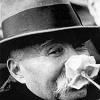- 27 Jul 2004 18:42
#392212
Dark Ages? You ever hear of the Renaissance? You see, the American continent was discovered during the early part of it.
Triggerhappy Nun wrote:Definitely the American revolution, who revived the idea of democracy after the Dark Ages set upon Europe. It had the most affect on the world to date, and had the longest-lasting effects. Many of the other revolutiond on that hardly lasted a century, the 1918 revolution lasted only 79 years, the French revolution lasting shorter than that with the rise of Napolean. Also, the Maoist revolution probably will not last the full 3 centuries and 2 decades (or, will be 2 decades in 2 years).
Dark Ages? You ever hear of the Renaissance? You see, the American continent was discovered during the early part of it.
Political forum vanguard.















 - By Potemkin
- By Potemkin - By KurtFF8
- By KurtFF8